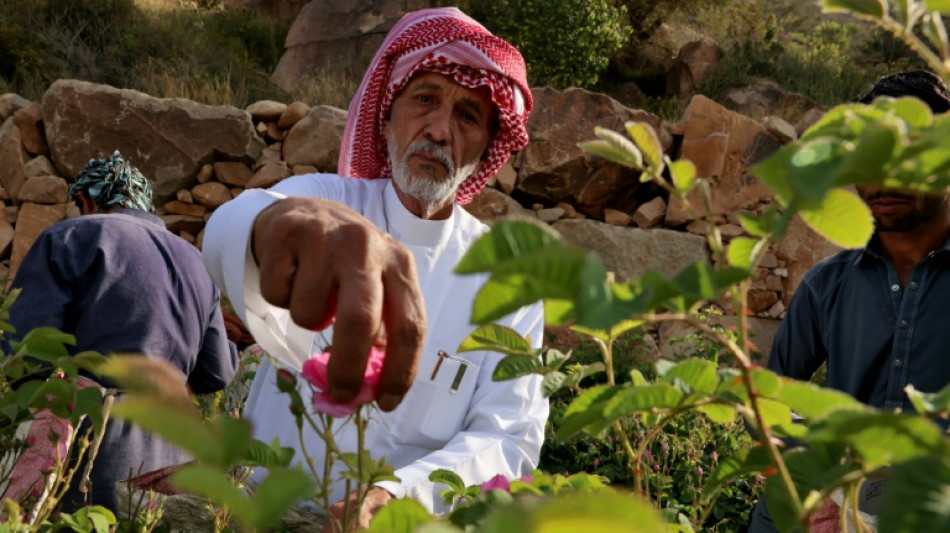
-
 Benfica investigate video of fans' monkey gestures
Benfica investigate video of fans' monkey gestures
-
French minister pledges tight security at rally for killed activist

-
 Guardiola 'couldn't care less' about Arsenal stumble in title race
Guardiola 'couldn't care less' about Arsenal stumble in title race
-
UK police search property as royals reel from Andrew's arrest

-
 Germany's Merz to visit China next week
Germany's Merz to visit China next week
-
Kompany says Mourinho made 'huge mistake' in Vinicius racism row

-
 X appeals EU's 120-mn-euro fine over digital content violations
X appeals EU's 120-mn-euro fine over digital content violations
-
Galthie recalls hulking locks Flament, Meafou for Italy

-
 Turkey, Saudi sign major solar power deal
Turkey, Saudi sign major solar power deal
-
US Olympic freeskier Hess embraces 'loser' tag after Trump blast

-
 European stocks rebound, oil prices ease after US-Iran volatility
European stocks rebound, oil prices ease after US-Iran volatility
-
'Alpha male' AI world shuts out women: computing prof Hall

-
 New Zealand freestyle skier Ives in hard Olympic crash
New Zealand freestyle skier Ives in hard Olympic crash
-
New Zealand must adapt quickly to Sri Lanka wickets: Chapman

-
 Thai activist's jail term for royal insult extended to 30 years
Thai activist's jail term for royal insult extended to 30 years
-
Families of Duterte's drug war victims eye Hague hearing with hope

-
 India chases 'DeepSeek moment' with homegrown AI
India chases 'DeepSeek moment' with homegrown AI
-
UN touts panel for 'human control' of AI at global summit

-
 Ukraine Paralympics team to boycott Opening Ceremony over Russian flag decision: statement
Ukraine Paralympics team to boycott Opening Ceremony over Russian flag decision: statement
-
UK monarchy reels from Andrew's stunning arrest

-
 Somaliland, where Muslims love Israel
Somaliland, where Muslims love Israel
-
Florida airport to be renamed after US President Donald Trump

-
 Fans flock to Japan zoo to see viral baby monkey Punch
Fans flock to Japan zoo to see viral baby monkey Punch
-
Stocks mixed, oil rises after Trump Iran threat

-
 Outspoken Laos lawmaker's election exit sparks rare dissent
Outspoken Laos lawmaker's election exit sparks rare dissent
-
Kim Jong Un vows to boost living standards as he opens rare congress

-
 Shepherd hat-trick to Samra ton: Five top T20 World Cup performances so far
Shepherd hat-trick to Samra ton: Five top T20 World Cup performances so far
-
Zimbabwe surprise as T20 World Cup Super Eights begin without Australia

-
 Victorious Takaichi promises 'strong and prosperous' Japan
Victorious Takaichi promises 'strong and prosperous' Japan
-
Ex-South Korea leader apologises for martial law crisis

-
 Ex-S. Korea leader apologises for martial law crisis
Ex-S. Korea leader apologises for martial law crisis
-
Messi kicks off MLS season in key World Cup year

-
 Teen burnout to Olympic gold: Alysa Liu 'looking to inspire others'
Teen burnout to Olympic gold: Alysa Liu 'looking to inspire others'
-
Cunningham stars as NBA-leading Pistons ease past Knicks

-
 Andre Gomes joins MLS side Columbus Crew
Andre Gomes joins MLS side Columbus Crew
-
Scottish inconsistency 'bugs everyone' says former international Beattie

-
 England turn to Pollock for Six Nations boost against Ireland
England turn to Pollock for Six Nations boost against Ireland
-
Arsenal aim to banish title jitters in Spurs showdown

-
 Scrutiny on Flick rises as Barca seek recovery
Scrutiny on Flick rises as Barca seek recovery
-
Leipzig host red-hot Dortmund with Champions League hopes slipping away

-
 Nvidia nears deal for scaled-down investment in OpenAI: report
Nvidia nears deal for scaled-down investment in OpenAI: report
-
Japan inflation eases in welcome news for PM Takaichi

-
 McIlroy shares Riviera clubhouse lead as Rai charges, Scheffler fades
McIlroy shares Riviera clubhouse lead as Rai charges, Scheffler fades
-
Philippines' Duterte earned global infamy, praise at home

-
 Stocks drop, oil rises after Trump Iran threat
Stocks drop, oil rises after Trump Iran threat
-
As European heads roll from Epstein links, US fallout muted

-
 Families of Duterte's drug war victims eye Hague hearing hopefully
Families of Duterte's drug war victims eye Hague hearing hopefully
-
Russian decision is a betrayal: Ukrainian Paralympics chief

-
 Venezuela parliament unanimously approves amnesty law
Venezuela parliament unanimously approves amnesty law
-
Martinez missing as Inter limp to Lecce after Bodo/Glimt humbling


Saudi 'city of roses' offers fragrant reminder of desert's beauty
After decades spent pruning thorny bushes and working arduous harvests, Khalaf Allah al-Talhi has perfected the art of capturing the fragrant aroma of the desert rose in a bottle.
"I love roses and take care of them more than I care for my own children," the 80-year-old told AFP from his flower farm in western Saudi Arabia's Taif.
Known as "the city of roses", the hills of Taif produce around 300 million of the area's signature pink roses annually at 800 flower farms.
By his own estimates, Talhi grows around five to six million of those.
The arrival of spring's mild climate is met with the blooming of roses that carpet the vast, rolling desert landscapes with vibrant shades of pink.
The blooms are then hand-picked from daybreak to late in the evening by an army of labourers.
The petals are soaked and boiled for hours in vats, where the rose's scent is extracted through an intricate process capturing the steam that is then distilled into aromatic oil.
The flowers have long been used to make rose water to wash the walls of the Kaaba at the Grand Mosque in Mecca, and perfumes made from Taif roses are popular with pilgrims visiting the kingdom.
- 'Many rose lovers' -
"The quantity of Taif roses is small, so only limited amounts are exported because it's not enough to meet local demand. Here in Saudi Arabia, we have many rose lovers who only prefer rose perfume," Talhi said.
A modest quantity of oil is exported to craft perfumes or to be added to cosmetic products such as moisturisers and soaps.
According to the economic database TrendEconomy, Saudi Arabia in 2023 exported just $141 million worth of perfume products, which includes rosewater.
At harvest time, workers on Talhi's farm pick tens of thousands of flowers daily.
"We were born on farms and have always worked in agriculture," said Talhi, wearing a white robe and a red checkered headscarf.
But now the greater frequency of erratic weather -- including searing summer heat, frigid winters and unexpected flooding -- presents a potent threat to Taif's famed roses.
- 'My soul' -
Climate scientists have issued regular warnings that every fraction of a degree of global warming increases the intensity and frequency of extreme weather events such as heatwaves, heavy rainfall and droughts.
Saudi Arabia, with its arid climate and vast deserts, is particularly vulnerable.
"Climate change accelerates soil degradation in processes such as salinisation, erosion, and desertification, which diminishes the quality and productivity of arable land in Saudi Arabia," read a report published by the Atlantic Council.
The think tank estimated that wheat yields were expected to decline by 20 to 30 percent by 2050 in Saudi Arabia because of heat stress and not enough irrigation water, while reductions are also expected for date palms and other staple crops.
The weather in the deserts around Taif has been no exception, according to Talhi.
"Last year and the year before, it was extremely cold. Some farmers didn't harvest a single flower from their fields."
Thankfully, this season has been more forgiving.
"There are weather changes, but this year the conditions have been very mild," he said.
While the weather may now be less reliable, Talhi himself has proven to be a source of stability.
Despite his advancing years, the octogenarian rises every day before sunrise to work the fields alongside his staff, and he often labours away until late into the night.
"This farm is my soul and beating heart," he told AFP.
"God willing, nothing will separate me from it, except death."
M.A.Colin--AMWN

